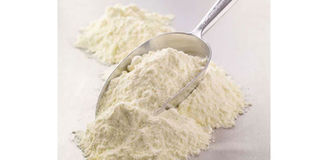Spin profits from powdered milk

Powdered milk. When starting this business, it is advisable to price your product at a lower cost than those on them market or package the product in small amounts to attract customers. PHOTO BY DOROTHY NAKAWEESI
What you need to know:
Demand for powdered milk is high especially among school-going children in boarding schools. Dorothy Nakaweesi elaborates on how to mint money from making powdered milk.
In 2008, Uganda opened its markets to powdered milk production - a product that has been added on the export list and local shelves.
Fresh Dairy and Pearl Dairy are some of the companies producing powdered milk on a large scale in the country. However, the demand is still huge.
In this article, we take you through the processes on how you can mint money from making powdered milk.
This idea could also benefit Ugandan living and working in the diaspora with the intention of investing back home.
Mr Newton Buteraba, the chief executive officer of House of Wealth – a local firm that offers business advisory services and motivational speaking, in an interview with Prosper Magazine, says: “Producing powdered milk is a good business idea that can bring you money if you target the local market and enter the market with low cost prices.”
He shares that right now a kilogramme of some of the renowned imported brands costs beyond Shs60,000.
“It would be advisable to price your product half that or else package the product in little amounts say like 100grams, 200 grams to attract customers,” Mr Buteraba advised.
Capital investment
To start this business according to Uganda Investment Authority records, you should be producing on a large scale since your target market will be schools.
To start, you will need investment capital of about $82,373 (Shs299 million), which will involve largely the procurement of equipment.
The business idea is premised on the production of 52,000 kg of powder milk per month, which translates into 624,000 kg per year.
The revenue potential is estimated at $208,000 (Shs755 million) per month, which translates into $2,496,000 (Shs9 billion) per year.
This means from your initial investment capital of $82,373 (Shs299 million), payback will be within a period of two months.
Direct costs include materials, supplies and other costs that directly go into production of the product.
Production process
Ideally, production of milk powder process starts with the supplies of milk which is the raw material and it is available in the country.
To start the process, milk bubbles are sprayed in hot air for 3 to 30 seconds. The water particles from the milk get evaporated and remain as powder. As this happens in fractions of time, the healthy particles of milk are protected.
Production assumed 312 days per year with a daily capacity of 20,000 litres of powdered milk.
Equipment
To start the business, equipment such as- auto miser, lacto scan, parking machine, storage containers, milk sampler and delivery van can be accessed locally but can also be imported.
The sizes and capacity of these equipment depend on the prospective production capacity.
Some of the suppliers of plant and machinery in Uganda is Snowman’s centre located in Industrial Area.
“When making decision to purchase any of these, factors such as maintainability, durability, operations-easily to operate and spare parts among others, should be considered,” Mr Buteraba advises.
Market
There is a ready market for dairy products in Uganda considering that milk and its products are consumed countrywide.
In order to expand your customer base, social media and other online platforms can be used to promote the product.
Market
“Government is supporting dairy farmers through funding the sector and has scrapped taxes on dairy products,” UIA report shows.
Nevertheless, personal savings will come in handy especially for the diasporas to start this kind of investment be enough to start the business on low scale.
“Accessing loan might be required for expansion which in turn facilitates increase in revenue. Such can be obtained from friends, family or Banks,” UIA report shows.
Being an agro-based business, equipment, tools and chemicals are mostly duty free on importation and/or subsidised by the government, others supports and subsidy are also available through the ministry of Agriculture both at state and federal level.




